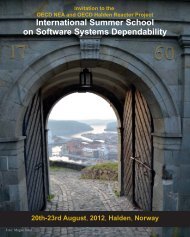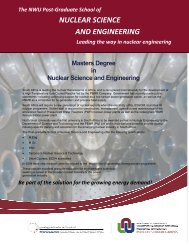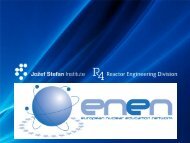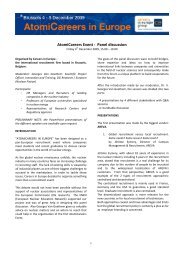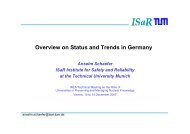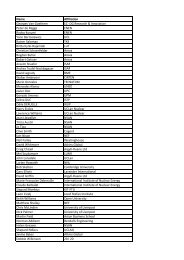Annex I Description of Work (April 2007) - ENEN Association
Annex I Description of Work (April 2007) - ENEN Association
Annex I Description of Work (April 2007) - ENEN Association
- No tags were found...
Create successful ePaper yourself
Turn your PDF publications into a flip-book with our unique Google optimized e-Paper software.
Euratom 2005-6 – Fixed deadline<br />
Coordination Actions<br />
<strong>ENEN</strong>-II<br />
1-18 Institute for Safety and Reliability (ISaR)<br />
The ISaR Institute for Safety and Reliability is a scientific organisation in the field <strong>of</strong> safety- and<br />
reliability engineering with a focus on nuclear technology. Areas <strong>of</strong> particular interest are<br />
quantitative risk and reliability assessment, simulation <strong>of</strong> nuclear power plants, nuclear systems<br />
technology as well as interdisciplinary questions related to safety and reliability.<br />
Key missions <strong>of</strong> the institute are:<br />
- to perform applied research on safety and reliability issues related to the operation <strong>of</strong> nuclear<br />
power plants,<br />
- to develop and run solutions tailored to the German phase-out situation for high-level academic<br />
education in nuclear technology and for training <strong>of</strong> young nuclear pr<strong>of</strong>essionals.<br />
A particular engagement concerns the transfer <strong>of</strong> knowledge to students and young pr<strong>of</strong>essionals by<br />
co-operating with the Technische Universität München in the education and specialization <strong>of</strong><br />
students in nuclear technology and by on-the-job training within the projects <strong>of</strong> the Institute.<br />
The ISaR Institute for Safety and Reliability is a limited liability company (GmbH) located at the<br />
research campus in Garching near Munich. Shareholder is the TUM-Tech GmbH, a technologytransfer<br />
organisation <strong>of</strong> the Technische Universität München. Funding is mainly provided by<br />
German utilities and by the Bavarian State Government. The Institute was founded in 2001 and<br />
started operation in January 2002.<br />
According to the Institute’s mission, ISaR staff is built <strong>of</strong> a group <strong>of</strong> highly qualified senior experts<br />
with long-standing experience and <strong>of</strong> an almost equal number <strong>of</strong> young scientists and engineers. At<br />
present, total staff is about 20 scientists and engineers.<br />
Anselm Schaefer : Diploma in Physics (TU München), DEA (University Strasbourg);<br />
Current Activity: Managing director <strong>of</strong> ISaR GmbH;<br />
Previous Activity: Head <strong>of</strong> strategic group at the Gesellschaft für Anlagen- und Reaktorsicherheit<br />
(GRS);<br />
Key Qualifications: Reactor physics, simulation and accident analysis <strong>of</strong> NPP’s, nuclear safety<br />
assessments, safety concepts and strategies.<br />
1-22 University <strong>of</strong> Stuttgart (IKE)<br />
The Universität Stuttgart is situated in the middle <strong>of</strong> a highly dynamic economic region with a<br />
worldwide reputation for excellency in the fields <strong>of</strong> mobile and information technology, production,<br />
process engineering as well as in life sciences. The Universität Stuttgart was founded in 1829, at the<br />
beginning <strong>of</strong> the industrial age in Europe, and will celebrate its 175 th anniversary in 2004. The<br />
cooperation between technical, physical and human sciences has always been an advantage <strong>of</strong> the<br />
Universität Stuttgart. Today the university is a modern, achievement-orientated institution with a<br />
comprehensive range <strong>of</strong> subjects and a focus on technical and physical disciplines. The maxim is not<br />
only „job-qualification“, but "technology, knowledge and education for mankind“, as the motto <strong>of</strong><br />
the Universität Stuttgart says.<br />
The 100 mio. Euro <strong>of</strong> annual third-party funding show that the university is a popular partner for<br />
European and German, federal and private organisations and the economy. 5.000 employees work in<br />
over 140 institutes,10 faculties and in central institutions; this makes the Universität Stuttgart one <strong>of</strong><br />
<strong>Annex</strong> I <strong>Description</strong> <strong>of</strong> <strong>Work</strong> - page 91 <strong>of</strong> 124



